
A Point Pleasant Park
Gallery
Despite many disturbances, and in spite of the large numbers of people
( in excess of 1.4 million visits a year), bicycles, and dogs that
frequent the park, it is still home to a large and diverse community of
plants and animals typical of boreal fores ts in eastern Canada.
The Point Pleasant Park Management Plan identifies nine principal
habitats found within the park including Benthic/Intertidal; Open Water;
Boulder & Cobble Shoreline; Freshwater Pond; Bog, Barren/Heath; Mixed
Forest (Red Spruce, Balsam Fir, Red & White
Pine, Red Maple, and White Birch), Coastal Forest (White Spruce); and
Cultural Imposed.
The Nova Scotia Bird Society has recorded 153 species of birds in the
Park including 39 species know to have nested there. A half dozen or more
species of mammals have recently been recorded there including an
introduced Coatimundi (Nasua nasua). Four species of amphibians,
and five species of reptiles are found in the park and at least twenty
species of fish have been recorded in the waters around the Park.
There are a very large number of invertebrates found in the Park, only
some of which have been identified and studied.
The following photo gallery pictures some of the more abundant animals
found there. We plan to continue adding photos to the gallery and we
invite anyone with photographs of animals taken there to submit them for
inclusion. Click on any of the thumb nails to see a larger view of the
animal.
Mammals
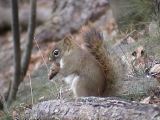 |
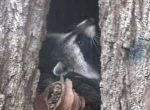 |
Red Squirrel: Tamiasciurus
hudsonicus
Feeding on Red Spruce cones. |
Racoon: Procyon lotor
An adult
sleeping in a den. |
Birds
 |
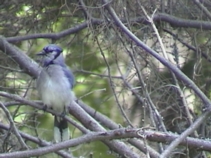 |
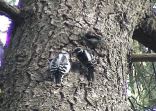 |
Black Duck: Anas rubripes
Feeding on along the shore. |
BlueJay: Cyanocitta cristata
Feeding in a Red Spruce. |
Downey Woodpecker: Picoides
pubescens
An adult feeds bark insects to a juvenile. |
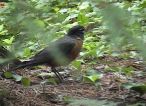 |
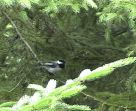 |
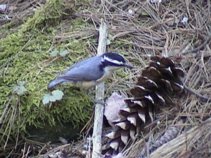 |
Robin: Turdus migratorius
Feeding on ground invertebrates. |
Black-capped Chickadee:
Poecile
atricapilla
An active feeder on Red Spruce. |
Red-breasted Nuthatch:
Sitta
canadensis
An active feeder on insects on Red Spruce. |
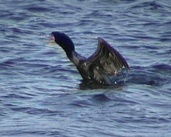 |
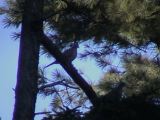 |
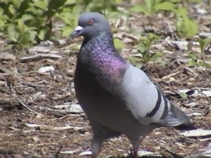 |
Double-crested Cormorant:
Phalacrocorax auritis
A resident throughout the
year. |
Mourning Dove:
Zenaida
macroura
Becoming increasingly common. |
Rock Dove:
Columba liva
A
visitor from urban habitats. |
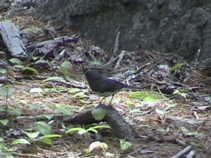 |
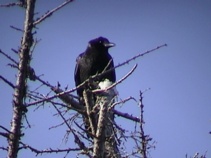 |
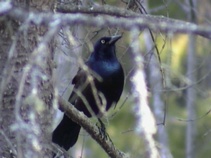 |
Dark-eyed Junco: Junco hyemalis
A ground-foraging sparrow. |
An American Crow: Corvus
brachyrynchos
a common bird in the park and city.
| ACommon Grackle: Quiscalus
quiscula
a summer breeder in the park.
|
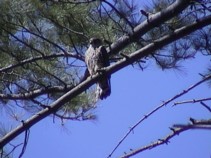 |
One of a pair of Merlins: Falco
columbarius
apparently nesting in the Park. |
Reptiles & Amphibians
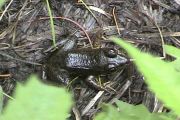 |
 |
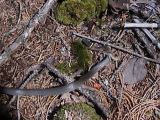 |
Green Frog: Rana clamitans
Found
in ponds & bogs. |
Redback Salamander:
Plethedon
cinereus
Abundant under rocks & logs. |
Northern Ringneck Snake:
Diadophis
punctatus
Persists in undisturbed areas. |
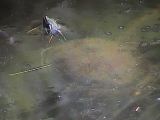 |
Easttern Painted Turtle:
Chrysemys
picta
Introduced to the bog pond. |
Insects
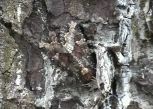 |
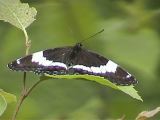 |
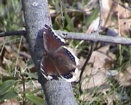 |
A Noctuid Moth:
Apamaea
ampulatrix
Disguised on Red Spruce bark. |
The Banded Purple:
Limenitis
arthemis
A woodland butterfly. |
A Mourning Cloak : Nymphalis
antiopa
They hibernate as adults and can be
observed in the
early spring and late fall. |
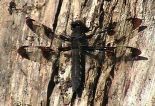 |
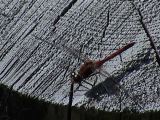 |
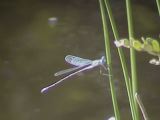 |
Common Whitetail:
Libellula
lydia
A female: found near bogs and ponds. |
A male White-faced Meadowhawk
Sympetrum obtrusum:
common throughout the forest. |
An (as yet) unidentified Damselfly
common near ponds. |
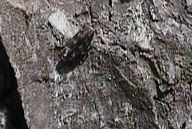 |
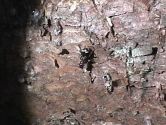 |
 |
Spotted Bupestrid:
Melanophila
fulvogutatta
A metallic woodboring beetle. |
A Checkered Beetle
Thanasimius
dubius:
avid predators of woodboring beetles. |
The Rustic Borer:
Xylotrechus
undulatus
A common borer on Red Spruce. |
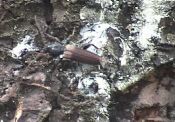 |
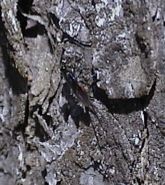 |
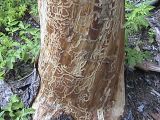 |
Brown Spruce Longhorn Beetle:
Tetropium fuscum
An introduced woodboring beetle. |
A Braconid Wasp: Atanycolus
sp.
Common in the Park they are
parasites of woodboring
insects. |
Traces of Woodboring Beetles
feeding on
cambium beneath the bark. |
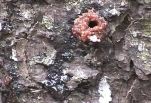 |
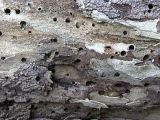 |
Bark Beetles (Scolytidae) resin tubes:
very common in the Park. |
Horntail Wasps (Siricidae) burrows:
Sawyer wasps are abundant. |
Other Invertebrates
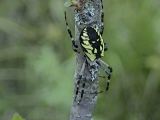 |
Black and Yellow Argiope:
Argiope
aurantica
A large spider of wet meadows. |
[Home]
[Press Releases]
[History]
[Get Involved]
[Photo Gallery]
[Links]





